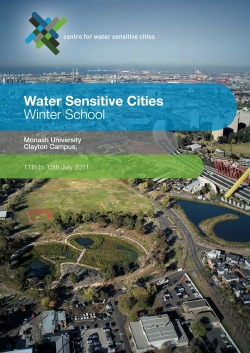news
Winter School: Building the knowledge to create a water sensitive city

15 August 2011
With the new directives for urban water reform delivered by the Victorian Government in March there is a strong mandate for an industry focus on integrated water management and liveable sustainable cities. To equip practitioners to deliver on proposed policy reforms it is vital that there are opportunities to stay up to date with the latest research and science in sustainable urban water management.
The Water Sensitive Cities Winter School held at Monash University from 11 - 15 July provided a week long intensive learning program for industry professionals and research students to learn about the key actions required to deliver water sensitive and liveable cities. Organised by the Centre for Water Sensitive Cities (CWSC) and Clearwater, the Winter School brought together presentations and perspectives from Australia’s leading researchers and thought leaders.
Lectures, workshops and site visits focused on distinct research areas such as stormwater treatment, urban design / modelling, climate change adaptation, behavioural change, and social and government engagement. However the key underlying message throughout the week was the importance of integration and inter-disciplinary approaches to move into a new type of urban water management and urban form.
Presenters put forward the view that Melbourne (and other Australian cities) need to make the transition from being ‘waterway cities’ that design for social amenity and environmental health to becoming ‘water sensitive cities’ that consider fully integrated water systems and are designed to be resilient to impacts of population growth and climate change. A water sensitive approach asks us to consider how we will keep our cities cool and green, how we will consider energy and transport in urban design, and how we will appropriately use and re-use all water sources. The social research team from CWSC put out the challenge that we need to shift to a new style of governance that adapts to allow environmental, social and planning considerations into the decision making process.
Attendees commented that they came away with a ‘deeper understanding of the vital role of urban water management in creating sustainable cities’, a ‘clearer idea on how we can transition to a water sensitive city’, and ‘access to useful tools and research to support current projects’.
The event was supported by Clearwater who work closely with the Centre on a range of projects. Key research and recommendations from CWSC research can be found in 2011 Blueprint for Stormwater Management in a Water Sensitive City and available on the Centre for Water Sensitive Cities website.
